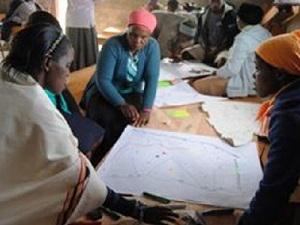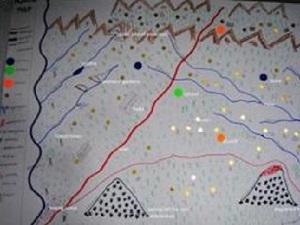Sandy Heather
The aim is for indigenous people with a living understanding of the imperative of biodiversity conservation leading local government planning.
The Indigenous People of Pondoland wish to develop in a manner respecting their culture and needs. Their plan is to create small-scale livelihoods projects which fit into the greater vision of community-based eco-tourism. Yet the area is earmarked for industrial style development that threatens ecological stability. Whilst from a western/scientific perspective we do not yet fully understand the ecosystems and diversity of endemic species in the area (a full study has never been done), the local people know that their socio-ecological lifestyle is what protects their biodiversity and maintains the ecosystems services upon which they depend.

Creating maps.
For the last 4 years a culturally embedded personal-development/empowerment programme has been run north of a formally Protected Area to form a strong and sustainable core to the development of ecologically sound livelihoods projects that will extend the conservation space beyond the Protected Area. On request of the local people two new elements are to be introduced. The first is a Biodiversity Assessment by local and international scientists focussing on plants, animals and fungi. This will be used for development planning and as an advocacy tool for living landscape sustainability and ecotourism by local people.

Finished map.
The 2nd is this project which is the development of a locally designed landscape management plan through participative mapping to be presented to Local Government. Due to the dire lack of capacity in Local Government in South Africa in general and in this area in particular, biodiversity consideration is generally excluded from planning and destruction of sensitive areas is rampant. The Pondoland Centre of Endemism is a culturally and ecologically intact area.
Local Government legislation stipulates participation by rural people in planning but they are usually insufficiently empowered to do so. However the people from this area, many of whom are illiterate, now are. They have the opportunity to steer development in favour of their conservation ideals.
This is a pilot project of local cultural/resource use/agricultural mapping and management design that is not limited in how it may be used. It will aid education, policy and planning, environmental conservation, lobbying government or assisting other research initiatives. It will be integrated with the Biodiversity Assessment and will be rolled-out to further areas where self development/empowerment work has capacitated the communities, by the local leaders who have been trained and mentored to do so.